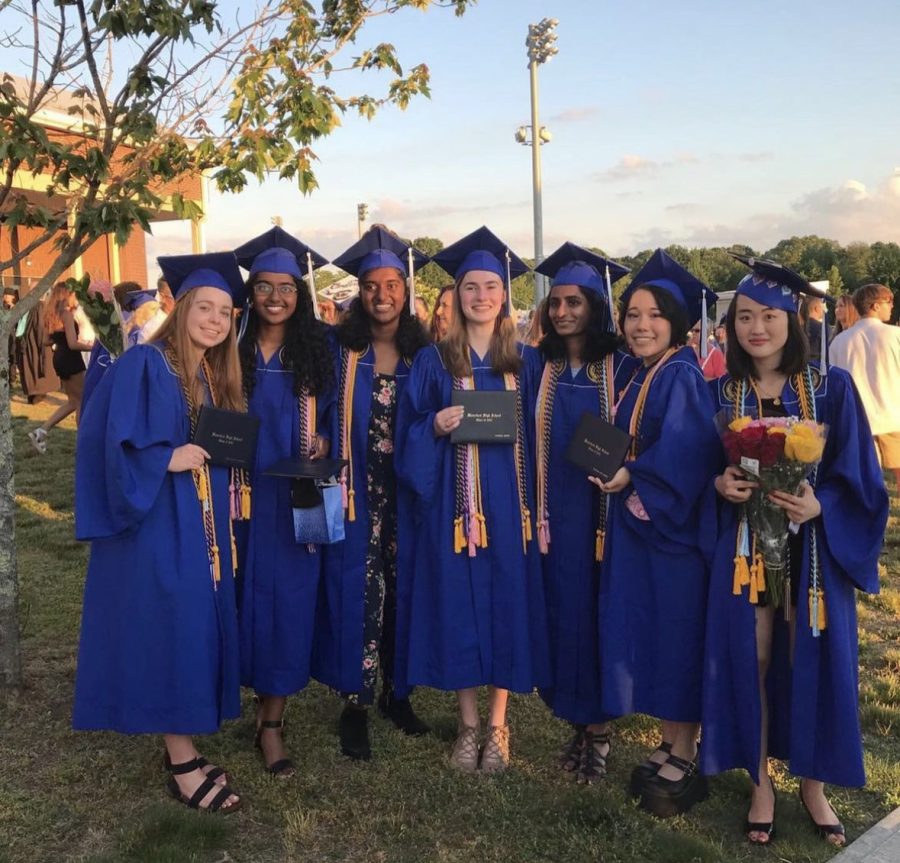Let’s Get that Cord!
Everything you need to know about Honors Societies.
May 10, 2023
Let’s get that Cord!
(All you need to know about Honors Societies)
In 2021, a Waterford alumnus, Willow Yang, graduated with six chords and Sabrina Tolppi graduated with three. By the end of their four years, many graduates have acquired at-least one cord, while many others do not know the meaning behind cords. Most of the cords are symbolic of an honor society. Each society has different requirements and processes for getting in and maintaining good standing. And although these honors societies can be time-consuming and difficult to get into, they have many advantages.
Benefits of joining an Honors Society include:
- Recognition for Academic Achievement: One of the main benefits of joining an honors society is the recognition you receive for your academic achievements. During graduation, you will get a chord by the honors society and will be recognized by your peers, teachers, and other members of your community for your dedication to academic excellence.
- Networking Opportunities: Honors societies provide an excellent opportunity for students to network with their peers who share similar interests and academic goals. This not only enhances the goals of the honors society but also helps the students appreciate that specific subject more. Moreover, These organizations often host events and activities that allow students to connect with one another and build relationships that can last well beyond high school.
- College Applications: Joining an honors society can also enhance your college application. Many colleges and universities look for students who have demonstrated academic excellence and leadership abilities, and being a member of an honors society is a great way to demonstrate your skills and experience.
- Scholarships and Awards: Some honors societies offer scholarships and awards to their members, which can help to offset the cost of college tuition or provide recognition for outstanding academic achievement.
The National Honors Society (NHS) consists of students from all areas of school life. This honor society looks for leaders throughout the community. Getting into this overall honors society shows that students are determined and successful in obtaining and maintaining good grades and participating in activities throughout Waterford town. To get an invitation to apply to the NHS, students must have a cumulative weighted GPA of 16.0 or higher after midterms in junior year. With the help of Ms. White and Ms. Leslie, eligible students are notified, and so are their parents. However, that is only the beginning, the application is the second step, in which students are given the opportunity to demonstrate excellence in all four pillars of the NHS. These pillars are Scholarship, Leadership, Service, and Character. The application has several parts to it. Students are asked to describe the activities/sports they take part in, community service they have done, leadership positions they hold, work experience they have, and awards they have won, along with an essay talking about their achievements and how that has impacted them. All this information is used (anonymously) and given to review to a panel of five teachers, who decide which students among the towns fit the NHS best. These students are all notified whether they got in or not a few weeks later, and if they choose to join are involved in activities throughout the community!
Similar to NHS, the Science National Honors Society (SNHS) uses a panel of teachers, who sit down together and review applications and decide who fits best. However, unlike the NHS, students are not invited to apply. Instead, they have to take it upon themselves to apply. The questions on the SNHS application are: What science classes has the student taken all their years at WHS, their grade in the class, what science clubs they partake in, and an open-ended response on why they want to be part of the SNHS. After completing the application, it should be emailed to Mrs. Herr, who then evaluates each application along with the other science teachers, deciding if they would make a good addition. In order to maintain good standing, students are to keep a 3.67 unweighted GPA or above in all their science courses. This means a 90+ in advanced science courses and an 80+ in honors-level science courses. The person who is in bad standing is put on probation for a quarter, if their grade does not improve, sadly, they will then be asked to leave. Moreover, members have to complete service hours by coming to the meetings and getting involved in community activities hosted by the SNHS. These activities can involve things such as helping out during marine science day (which will be hosted on May 30th and Waterford Beach), and/or presenting the various science courses offered at the high school to the upcoming freshman. Junior, Kyijong Tenzin, very much recommends this organization, and honors societies in general for subjects that interest them. She said, “I think joining a society is worth it because you’re able to pursue more related events and projects outside of class and school with other interested peers. I joined SNHS because of Ocean Day. Other students who did it enjoyed it when they were younger, so helping run it seems fun too. However, she also feels that the participation level in societies seems to decrease once the students get into the organization, saying, “There is a “prestige” that comes with being part of an Honors Society, and some students don’t work to deserve it, but I think that’s why there are requirements for students in order to not be dismissed from the society.” She believes the service hours and grades that are needed to remain in society are reasonable and a positive that should definitely be kept and exercised.
The National Technical Honors Society has an application similar to that of SNHS. It asks about the classes students have taken and the overall grade they got/have in the class. Moreover, they also require their students to have a 3.75 unweighted GPA, greater than SNHS. However, only 2.5 tech credits are required to be eligible to apply, which is great for students who have not taken tech classes each year but still want to be part of the honors society. Senior Katherine Hawkins said, “I thought that like most honors societies, I would have to have taken a tech course every year, which I hadn’t done and so I did not apply, but now I regret it.” The application also asks the students to answer questions about how the tech classes have impacted students, which classes have interested them the most and why, what activities are they looking to get involved in, and how they plan to use these skills they acquire beyond graduation. Overall, this new honors society is something many people are eligible for, they just are not aware of it.
In the TRI-M Music Honors Society, all music students are invited to apply to start their sophomore year. In the application, they are asked open-ended questions about why being part of a music ensemble is important and to describe how they showcase their love and passion for music. As far as the requirements go for applying, students are to be enrolled in a performing music class every year at WHS. They are also to be a part of an outside music group, have auditioned for a CMEA honor performing ensemble, or have the ability to perform a mock audition at the level appropriate for CMEA. Also, they are to have and maintain a cumulative GPA of 3.5. For continuing members, participate in 80% of the activities that are hosted by the society and complete 10 service hours specific to the organization. These service hours can be through meetings, the instrument drives that are coming up, and/or by helping in middle and elementary school concerts.
Continuing the streak, for the National Art Honors Society (NAHS), any student who has/is taking art can apply. The application requires them to have two staff recommendations (non-art teachers), have a sponsoring art teacher, and write an essay explaining the role of art in their life, what attributes they offer the organization, and what they expect out of NAHS. They also have to have earned a 90% or higher in their class and show excellent character. When accepted into society, staying in good standing requires attending their bi-monthly meetings, and earning 8 hours of “art” community service. Failure to do these will unfortunately result in members being asked to leave. In all, this honors society does not ask too much of its students and is one that many would recommend. Senior Maybel Fuller talked about how she would encourage people to join, saying, “I would definitely recommend people to apply, I feel as though it pushes me and others to stay involved with art no matter what.” Moreover, she also believes that being a part of this is more of a learning opportunity rather than just an academic achievement, which is what honors societies should be about to begin with. Alongside Kyijong Tenzin, Maybel also has noticed a decline in participation once students get accepted into society, and agrees with the rules put in place to make sure people remain in good standing.
In World Language Honors Societies, each language has its own organization: French (FHS), Spanish (SHS), and Latin (LHS). Each student is invited based on their academic performance in their language class. The student must have a 90 (3.5 GPA) or above grade for each of the prior three semesters to be invited to apply, as well as a 3.0 overall GPA across their other subjects. Once invited, they are asked to fill out a form that asks why world languages are important to study, why they are important to them, and why they should be accepted. Similarly to SNHS, student’s grades are regularly checked, and if too low for more than one quarter after going on prohibition, they are asked to leave. Moreover, service hours are also required to stay in the society. Students are to attend 90% of the meetings and also participate in their respective language activities.
Joining an honors society in high school can be a rewarding experience that provides students with recognition for their academic achievements, networking opportunities, and leadership development. However, students should carefully consider the academic requirements, community service obligations, and membership dues before joining an organization. With the right mindset and dedication, membership in an honors society can help students achieve their academic and personal goals. However, being part of one does not guarantee success or make an individual any more/less likely to be successful than another. Moreover, just getting into an honors society for the sake of a cord is not the goal. The person’s passion for the topic/subject and or benefiting the community in that area should be the driving force for wanting to take part in the society, which many students, in the craze of wanting to improve their college applications, forget.






